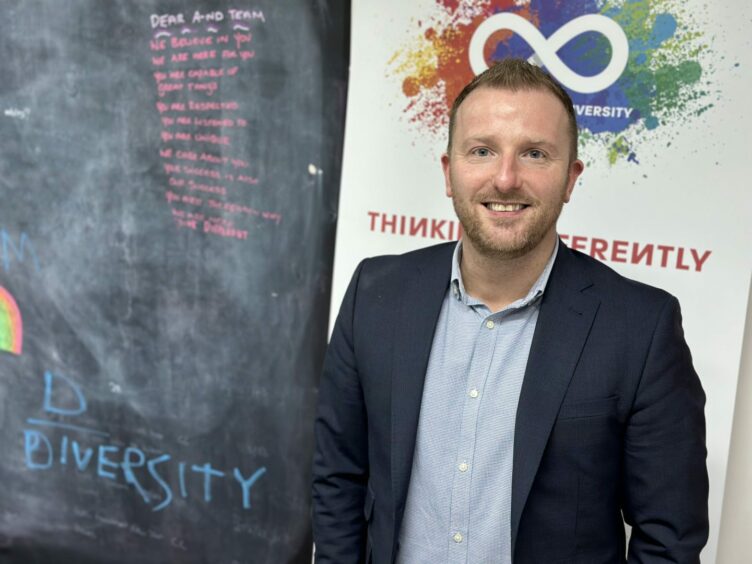
“People still refer to things like Rain Man and things like that” when it comes to neurodiversity in the workplace, Billy Alexander, of Autism and Neurodiversity North Scotland, said.
However, there are some prominent firms in the energy sector that are looking to make the neurodiverse workforce more welcome.
Some of the firms Mr Alexander’s team works with include Aker Solutions and Serica.
Billy Alexander, CEO of Autism and Neurodiversity North Scotland (A-ND), told Energy Voice that his organisation is working with various energy firms to ensure that they can cater to the needs of those on the neurodiversity spectrum to create more productive and enjoyable workplaces.
Mr Alexander said that by making “reasonable adjustments” to the way in which an employee works a firm can see “up to 50% increase in productivity, which benefits organisations, teams and people because people then feel that they’re contributing, that they’re being able to use their strengths and abilities but not in a typical way.”
‘There’s discrimination and neurodiversity is a hidden disability’
“There are loads of stigmas,” Mr Alexander said when asked about the discrimination faced by those with neurodiverse conditions in the workplace.
He said: “First and foremost, a lot of neurodivergent people won’t disclose they’re neurodivergent because of the stigma they face.
“There’s discrimination and neurodiversity is a hidden disability, so you can’t often see it.”
Also, the common belief when people think of autism is based on a limited point of view. “People still refer to things like Rain Man and things like that,” Mr Alexander said.
The A-ND chief executive listed some probing questions that those with neurological conditions may face when at work.
“Why can’t we just go on with that?
“Why can’t you just come into the room?
“Why must you sit in the same seat?”
Billy Alexander asked: “If you don’t have that level of understanding from your senior management team and your leadership team, never mind the team around you, could you imagine what that would be like to walk into?”
‘Reasonable adjustments’
Between 15 and 20% of people are neurodivergent and “we’re starting to understand that more and therefore it’s becoming more diagnosed,” the A-ND boss said
Recently the number of attention deficit hyperactivity disorder (ADHD) diagnoses increased “sevenfold” in the last year, highlighting the importance of supporting the neurodiverse workforce.
Mr Alexander explained: “A nine-to-five Monday to Friday office job wouldn’t fit some of the neurodivergent people that we work with, but they might be able to work from two in the morning right through to six.
“As long as they get the outcome and it’s achieved on the timeframe set, how they do that, surely that’s okay to be different.
These are the types of “reasonable adjustments” that Billy Alexander and the team at A-ND suggest when working with firms such as Global E&C, Aker Solutions and other energy firms.
The changes suggested by A-ND “are really impactful, not just to the individual” but for the businesses they work for.
Mr Alexander understands that firms “need certain things at certain times” and in the two years of Autism and Neurodiversity North Scotland has been working with Global E&C “we’re seeing good results.”
Global is “quite far down their journey and Aker Solutions, another organisation that I’m working with just now, is just at the beginning of their journey,” said Billy Alexander, “I’ve met with their D&I team and done some awareness training, I’ve now gone into their environment, they took me into their workshop.
“As you can imagine that environment is very loud and there’s lots going on, so how do you make this neuro-inclusive, especially for someone who’s autistic? That’s a real challenge.”
However, not everything has to change to ensure an environment is neuro-inclusive, according to Mr Alexander Aker Solutions already had “really good practices going on” when he visited.
To build on what Aker Solutions already do, in October and November the whole leadership team are getting neuro-inclusive training, A-ND explained.
Defining neurodiversity
Before making the “reasonable adjustments” that Mr Alexander and his team outline, a firm must understand what is meant by neurodiversity and how it may be impacting the workforce.
The A-ND chief executive said: “Neurodiversity covers all neurological types.
“So, neurodiversity is the natural variation in every single one of our brains. Whether you’re neurotypical, meaning that you’ve typically developed or developed like a typical, or if you’re neurodivergent, which means you’ve slightly diverted from the typical development of the brain.”
Mr Alexander added: “What’s really important is neurodiversity covers every neural type regardless because if you were put in under this brain scan, there’s not one brain in the world that would look identically the same.
“They are all different, whether you’re neurotypical or whether you’re neurodivergent.”
The term neurodiversity is “an attempt to be inclusive” Billy Alexander explained, and it is used to “celebrate the strengths” of those with neurodivergent conditions.
‘I can’t personally keep up with the demand’
Energy firms are looking to ensure the neurodiverse workforce is afforded the same level of comfort as neurotypical employees and as a result, A-ND is seeing a “huge demand” for its services.
Mr Alexender said: “I can’t personally keep up with the demand, not only from the energy sector.
“Once one hears of it and it’s not just hearing about it, they see the benefit. They see the productivity increase, they see a happier, healthier workforce, it reduces absences and sickness, and people stay.
“Money is important but if they feel included, valued and respected, that goes a long way too.”
He added: “When Global have that and they see the results then Aker go ‘we want a bit of that too’ then Serica ‘we’d like a bit of that too’ and so on and so on.”
A-ND has also been approached by Shell to bring its training to the supermajor’s staff at the St Fergus gas terminal in Aberdeenshire.
In addition to working with the private firms, A-ND also supports the public sector having picked up work in NHS training.
Mr Alexander explained: “There’s only so much I can do, I’m only one man so I can’t work with many organisations at once.”
The demand for Billy Alexander’s services from energy firms like Serica, Shell, Global E&C and Aker Solutions is a positive sign that the sector is looking to welcome a more diverse range of people into its ranks.
That being said, there is still a stigma around neurodiversity and the labels that come under the umbrella of neurodivergent conditions.
The energy sector is taking ‘steps in the right direction’
Despite the inaccessible or uncomfortable working environments that may be in the energy sector for neurodivergent people, through no malicious intent of employers, the dial is moving on neuro-inclusivity.
Mr Alexander said: “I think that in business now, especially in the energy sector, they’re getting wiser.
“They understand what my experience is they’re definitely understanding the benefits of having a neurodiverse workforce, and they understand the abilities of people that think differently.”
Billy Alexander explained that when a diverse group of people “who think differently” working on the same project “can create really innovative solutions and bring the real creativity to a room.”
Getting over the ‘panic’ around reasonable adjustments
To get to a point where there is diversity of thought in a room, reasonable adjustments must be made, and some are still scared of the thought of making changes.
The A-ND boss also finds himself feeling wary: “I think businesses who think here the word reasonable adjustments, I sometimes panic and myself running my own organisation when someone says, ‘I need a reasonable adjustment’, there’s that first ‘What does that mean? What’s that going to cost? What’s that going to look like?’
“More often than not, it’s a reasonable fix. Most individuals are very reasonable if you say ‘We can’t do that right now’ or ‘That’s going to cost a lot, is there something else we can do?’, most individuals will be flexible and will work with you on that.”
To achieve the changes Billy Alexander speaks about and reap the benefits of a diverse workforce, changes must be made and that can only come with understanding the struggles the neurodiverse workforce faces.
Mr Alexander explained: “The only way we can tackle some of the stigma around that is by raising awareness and also understanding because it’s more than just awareness of neurodiversity, it’s also understanding its extent and also the challenges that come with that.”
Recommended for you


 © Supplied by ThinkPR
© Supplied by ThinkPR